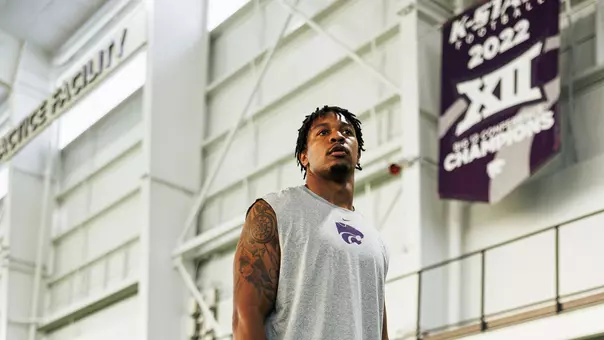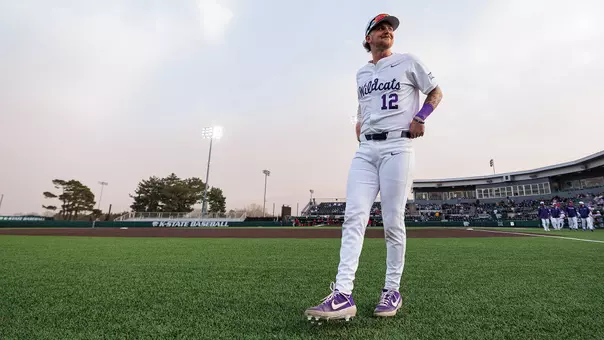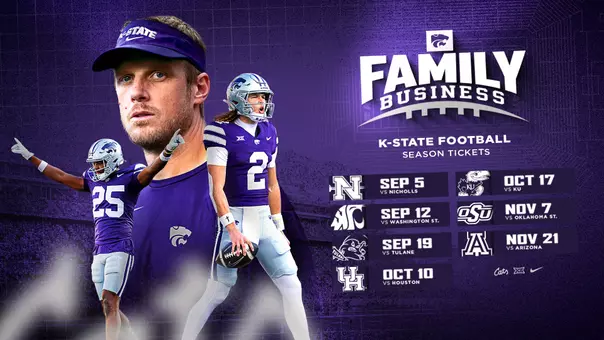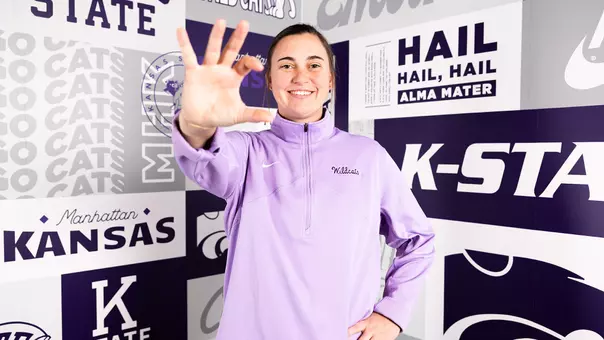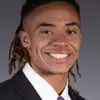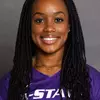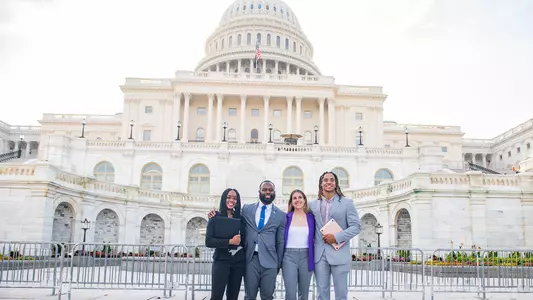
An Opportunity to Grow
Jul 26, 2024 | Football, Volleyball, Sports Extra
By: D. Scott Fritchen
Kansas State sophomore volleyball player Symone Sims and redshirt freshman football player Asa Newsom were given the opportunity of a lifetime as both student-athletes participated July 5-9 in the launch of the Big 12 Beyond Borders program in Washington, D.C.
The visit to the Nation's Capitol featured stops on Capitol Hill to meet with congressional members and senators, visits to multiple museums including the National Museum of African American History and Culture, and the United States Holocaust Memorial Museum, and the Native American History Museum, while student-athletes also participated in a community service project at a local elementary school.
Two student-athletes from all 16 Big 12 schools attended the conference.
Sims and Newsom sat down with K-State Sports Extra's D. Scott Fritchen to discuss their recent trip along with their various experiences that impacted their lives and could make a difference going forward:
D. Scott Fritchen: On a scale of 1-10, just how meaningful was the experience of representing K-State at the Big 12 Beyond Borders conference?
Symone Sims: I definitely think it was a 9 or a 10, honestly. Being around like-minded athletes it's kind of hard to when you're at school and are stuck in the mindset of "we're student-athletes" and focus on the "athlete" portion, but being around like-minded athletes that were successful in their sport but wanted to be successful outside of their sport, it was nice to be around that kind of atmosphere — people who care about who they are not just in the sport, but personally.
Asa Newsom: I'd rate it a 10. I wasn't really sure what I was getting myself into, but it was a great leadership opportunity. At first, I was kind of worried about missing some workouts and taking some time off, but I grew in a way that I couldn't have grown in any other way with this opportunity. I was around young leaders who were bought into this opportunity. Being around so many different perspectives were unique. It's something I'd never been around. I changed in a lot of different ways.
Fritchen: When did you find out you had been selected to attend the conference? Did you apply to go? What was your immediate reaction when you learned that you had been selected?
Sims: I was thinking it was a free trip. That was my reaction. I thought it'd be cool knowing we were going to go to Capitol Hill and talk to some representatives is something that caught my attention right off the bat. This actually wasn't my first trip to Washington, D.C. I went there last year for my sister's graduation from Howard. I like Washington, D.C., a lot. I think it's gorgeous. I like the atmosphere. It's a busier atmosphere than Manhattan. I'm from the city, so I like being around that kind of environment for sure.
Newsom: I didn't know what I was getting myself into. It was a new Big 12 program. I was excited to see what would happen. I went to Washington, D.C., in the sixth grade. I love it. I think it's powerful. There are a lot of great monuments you learn about.

Fritchen: What were one or two things on the five-day agenda that you most looked forward to, or were most eager for?
Sims: Looking at the itinerary, every meal we'd have a "Issues on the Table," so we'd discuss whatever we had seen in these museums we'd been to over the past two days. I was interested in hearing other people's perspectives and mindsets. The second thing I think about is going to Capitol Hill. It's an opportunity not everybody gets, and being able to do that and advocate for something that I care about was really cool. Helping the elementary school was definitely impactful. These kids aren't as fortunate. Their idea of where they can go in the future is very much kept within a box. Some kid told me he wanted to be a pizza driver when he was older. Being there and being able to talk to these kids and tell them we're student-athletes and we were able to get to this point. So, we tried to put into these kids' minds that they do have a bright future ahead of them. That's something that really stood out to me with that community project.
Newsom: Probably the thing I was most excited about was going to the African American Museum. It was really powerful to learn more about my history and the history of the nation. That moment really moved me. The museum really moved me. I learned a lot that I thought I already knew about. Then we got to visit an elementary school one day and helped out around there. We painted around the school and interacted with the kids during lunch and P.E., and that was impactful because it was a school that wasn't as fortunate.
Fritchen: When did you find out you were going to work with athletes from other schools to present topics at Capitol Hill? What was your reaction?
Sims: I was definitely nervous because I wasn't exactly sure — I thought the entire group was going to give a slide-show presentation. That definitely wasn't the case. There were groups of four or five of us, and we were all assigned different topics. I received the topic of "NCAA and Title IX." I was really impressed with how organized it was and how we were able to bring in our different perspectives was pretty cool.
For my topic, "NCAA and Title IX," we were advocating for the HR-8534 Bill, which is a bill that prohibits student-athletes from being employees. I really focused on the equity versus equality piece in that. If student-athletes were to be employees from a Title IX standpoint, the female student-athletes would be now looked at under a Title VII standpoint in the workplace. It's kind of that little piece of equity versus equality. We know women's sports aren't as equal to football – we're aware of that – but still kind of making sure we maintain that equity piece of being able to get what we need to thrive as women's sports. That's some of what I focused on.
Fritchen: Asa, your topic to present to Congress was "Mental Health Resources and Addiction." What were some of the key points you hit on?
Newsom: The biggest thing was these kids were less fortunate and at times their lives are a hectic life. The only way they'd have a stable, consistent moment during the day was at school. So, it was about equipping teachers with the skills and abilities where they feel like they can handle and support a kid who needs some mental health, which can go a long way. Especially in some states, it's hard to pay teachers, so staying out of the money issue, we just said, "Maybe we can somehow have a training system where the teachers are field trained to help students who need help." It was kind of giving these kids more help that they don't have at home.

Fritchen: So, there were 32 student-athletes from 16 Big 12 schools who attended the conference. It must've felt like such an honor that you were selected to be able to present to Congress.
Sims: It's honestly something I can't describe. Once I got there, I was nervous, just not knowing what kind of group of people we were presenting to, but it was such an honor just because being around these student-athletes, I know they're very strong-minded people, very educated, but they're also good at their sport. Knowing that and knowing that I was chosen, it felt very good. I don't have any words.
Newsom: I just felt blessed on so many different levels. To get there and work with so many student-athletes who are really bright in so many different ways, and people who come from so many different walks of life, it's crazy. I talked with people from different areas, I had no idea, and I talked to people from different religions, and got into so many deep conversations. I think that's where I grew so much. I put on so many different lenses on the trip and it widened my perspective, which was really cool. I just felt blessed by the Big 12 to put us student-athletes together.
Fritchen: Describe the presentation room like while presenting to Congress?
Sims: I presented in front of legislative aide, and it was a lot more relaxed than I thought. It was just more of a conversation. Seeing that our opinion mattered made my day. I actually felt like I might actually be able to make a difference. There were 32 of us student-athletes and there were a lot of different topics, would we be able to make a difference? These people were taking notes, and they did care and took on our viewpoints and perspective was a great thing.
Newsom: It felt real. It felt like you could say something that would make an impact and that you mattered. The environment was relaxed. People in our groups talked for different meetings. We talked for three meetings. We talked for three people. That was exciting. In my group, we shared our personal experiences. Those people were important, and they listened to what we had to say. That was a cool feeling.
Fritchen: Jenn Hunter, Chief Impact Officer at the Big 12, says the conference is "a way to help develop our student-athletes into the global leaders of tomorrow." Exactly how did the conference enrich your life?
Sims: Just being able to be around people of different backgrounds, going to three different museums and putting on different lenses and different viewpoints through America's history was definitely impactful. For me, I focused a lot on African American history just because I am African American, but it was really cool to get into that Holocaust Museum and into the Native American Museum and really see how many different groups of people made an impact on America.

Fritchen: Describe your experience with the museums. What were your takeaways?
Newsom: The first museum was the Holocaust Museum. We had learned about it in school, but there are so many different levels you can go into and dive deeper into. It was education day. I soaked up everything. Then the next day we walked into the African American Museum and there was a sense of pride walking through it. You learn things and read things that you were taught growing up, things I learned from my grandmother, and there was a sense of sadness as you go through some hard times in this country. Then you walk through the Native American Museum, and you're like, "What can I learn and what can I soak up?" I feel more equipped as a leader for my football team, for the leadership team. Especially as a younger guy, too, being able to connect with so many different people and having different perspectives now in understanding others, I listen more in an effective way, and I learn different points of views. I left Washington, D.C., feeling more equipped coming back to Manhattan as a leader.
Fritchen: What would be your advice to fellow K-State student-athletes who might one day aspire to attend the Big 12 Beyond Borders conference?
Newsom: If you want to have an open mind and learn more about yourself and have those tough conversations with yourself, and if you really want to grow, then you should dive into it. If you're not ready to grow yet and be real with yourself, then you have to ask yourself if you're really going to benefit from it.
Sims: One thing I'd recommend is leaning into being vulnerable with people. Coming in my freshman year, I had this hard shell over me and didn't want anybody to see who I truly was, but leaning into that vulnerability allows you to be more of yourself as a person and allows you to see your teammates and coaches and all our support staff as who you truly are, and that allows you to flourish and grow more.

Fritchen: The theme today seems to be "learning." The question I'll end with is this: What have you learned most about yourself during your journey?
Newsom: Coming to K-State, I mean, I came to K-State to play football, and you come into the facility and you're boarded up, and I'm going to work, and I'm going to grind, and I'm going to show the coaches I can work hard, and I gain respect in becoming a leader, but you don't check in with yourself sometimes, and I got some things off my chest on the trip that I didn't really know I had on my chest just by opening up with fellow student-athletes who I'd only known for four days. That's when I really grew, was when I let go. Another thing is the learning – every day I try to find a way to be the best leader, and the best way to be a leader is to be a learner, and that was just another perfect opportunity to learn about other religions, other people, other perspectives. Those are my biggest takeaways.
Sims: Something I learned about myself is that in this K-State bubble I'm in, I tend to take things for granted just because everything is thrown at us so fast when we get here that we kind of acclimate to this environment, but going to these museums and doing the community service project really made me open my eyes to everything that I have and everything that we receive as student-athletes, specifically, just because we are getting a lot more than maybe the average college student. Being here in the moment right now, and not worrying about my future, worrying about what I did and where I messed up in the past, and just being grateful for who I am and learning to become more present is something I definitely learned on the trip.
Kansas State sophomore volleyball player Symone Sims and redshirt freshman football player Asa Newsom were given the opportunity of a lifetime as both student-athletes participated July 5-9 in the launch of the Big 12 Beyond Borders program in Washington, D.C.
The visit to the Nation's Capitol featured stops on Capitol Hill to meet with congressional members and senators, visits to multiple museums including the National Museum of African American History and Culture, and the United States Holocaust Memorial Museum, and the Native American History Museum, while student-athletes also participated in a community service project at a local elementary school.
Two student-athletes from all 16 Big 12 schools attended the conference.
Sims and Newsom sat down with K-State Sports Extra's D. Scott Fritchen to discuss their recent trip along with their various experiences that impacted their lives and could make a difference going forward:
D. Scott Fritchen: On a scale of 1-10, just how meaningful was the experience of representing K-State at the Big 12 Beyond Borders conference?
Symone Sims: I definitely think it was a 9 or a 10, honestly. Being around like-minded athletes it's kind of hard to when you're at school and are stuck in the mindset of "we're student-athletes" and focus on the "athlete" portion, but being around like-minded athletes that were successful in their sport but wanted to be successful outside of their sport, it was nice to be around that kind of atmosphere — people who care about who they are not just in the sport, but personally.
Asa Newsom: I'd rate it a 10. I wasn't really sure what I was getting myself into, but it was a great leadership opportunity. At first, I was kind of worried about missing some workouts and taking some time off, but I grew in a way that I couldn't have grown in any other way with this opportunity. I was around young leaders who were bought into this opportunity. Being around so many different perspectives were unique. It's something I'd never been around. I changed in a lot of different ways.
Fritchen: When did you find out you had been selected to attend the conference? Did you apply to go? What was your immediate reaction when you learned that you had been selected?
Sims: I was thinking it was a free trip. That was my reaction. I thought it'd be cool knowing we were going to go to Capitol Hill and talk to some representatives is something that caught my attention right off the bat. This actually wasn't my first trip to Washington, D.C. I went there last year for my sister's graduation from Howard. I like Washington, D.C., a lot. I think it's gorgeous. I like the atmosphere. It's a busier atmosphere than Manhattan. I'm from the city, so I like being around that kind of environment for sure.
Newsom: I didn't know what I was getting myself into. It was a new Big 12 program. I was excited to see what would happen. I went to Washington, D.C., in the sixth grade. I love it. I think it's powerful. There are a lot of great monuments you learn about.

Fritchen: What were one or two things on the five-day agenda that you most looked forward to, or were most eager for?
Sims: Looking at the itinerary, every meal we'd have a "Issues on the Table," so we'd discuss whatever we had seen in these museums we'd been to over the past two days. I was interested in hearing other people's perspectives and mindsets. The second thing I think about is going to Capitol Hill. It's an opportunity not everybody gets, and being able to do that and advocate for something that I care about was really cool. Helping the elementary school was definitely impactful. These kids aren't as fortunate. Their idea of where they can go in the future is very much kept within a box. Some kid told me he wanted to be a pizza driver when he was older. Being there and being able to talk to these kids and tell them we're student-athletes and we were able to get to this point. So, we tried to put into these kids' minds that they do have a bright future ahead of them. That's something that really stood out to me with that community project.
Newsom: Probably the thing I was most excited about was going to the African American Museum. It was really powerful to learn more about my history and the history of the nation. That moment really moved me. The museum really moved me. I learned a lot that I thought I already knew about. Then we got to visit an elementary school one day and helped out around there. We painted around the school and interacted with the kids during lunch and P.E., and that was impactful because it was a school that wasn't as fortunate.
Fritchen: When did you find out you were going to work with athletes from other schools to present topics at Capitol Hill? What was your reaction?
Sims: I was definitely nervous because I wasn't exactly sure — I thought the entire group was going to give a slide-show presentation. That definitely wasn't the case. There were groups of four or five of us, and we were all assigned different topics. I received the topic of "NCAA and Title IX." I was really impressed with how organized it was and how we were able to bring in our different perspectives was pretty cool.
For my topic, "NCAA and Title IX," we were advocating for the HR-8534 Bill, which is a bill that prohibits student-athletes from being employees. I really focused on the equity versus equality piece in that. If student-athletes were to be employees from a Title IX standpoint, the female student-athletes would be now looked at under a Title VII standpoint in the workplace. It's kind of that little piece of equity versus equality. We know women's sports aren't as equal to football – we're aware of that – but still kind of making sure we maintain that equity piece of being able to get what we need to thrive as women's sports. That's some of what I focused on.
Fritchen: Asa, your topic to present to Congress was "Mental Health Resources and Addiction." What were some of the key points you hit on?
Newsom: The biggest thing was these kids were less fortunate and at times their lives are a hectic life. The only way they'd have a stable, consistent moment during the day was at school. So, it was about equipping teachers with the skills and abilities where they feel like they can handle and support a kid who needs some mental health, which can go a long way. Especially in some states, it's hard to pay teachers, so staying out of the money issue, we just said, "Maybe we can somehow have a training system where the teachers are field trained to help students who need help." It was kind of giving these kids more help that they don't have at home.

Fritchen: So, there were 32 student-athletes from 16 Big 12 schools who attended the conference. It must've felt like such an honor that you were selected to be able to present to Congress.
Sims: It's honestly something I can't describe. Once I got there, I was nervous, just not knowing what kind of group of people we were presenting to, but it was such an honor just because being around these student-athletes, I know they're very strong-minded people, very educated, but they're also good at their sport. Knowing that and knowing that I was chosen, it felt very good. I don't have any words.
Newsom: I just felt blessed on so many different levels. To get there and work with so many student-athletes who are really bright in so many different ways, and people who come from so many different walks of life, it's crazy. I talked with people from different areas, I had no idea, and I talked to people from different religions, and got into so many deep conversations. I think that's where I grew so much. I put on so many different lenses on the trip and it widened my perspective, which was really cool. I just felt blessed by the Big 12 to put us student-athletes together.
Fritchen: Describe the presentation room like while presenting to Congress?
Sims: I presented in front of legislative aide, and it was a lot more relaxed than I thought. It was just more of a conversation. Seeing that our opinion mattered made my day. I actually felt like I might actually be able to make a difference. There were 32 of us student-athletes and there were a lot of different topics, would we be able to make a difference? These people were taking notes, and they did care and took on our viewpoints and perspective was a great thing.
Newsom: It felt real. It felt like you could say something that would make an impact and that you mattered. The environment was relaxed. People in our groups talked for different meetings. We talked for three meetings. We talked for three people. That was exciting. In my group, we shared our personal experiences. Those people were important, and they listened to what we had to say. That was a cool feeling.
Fritchen: Jenn Hunter, Chief Impact Officer at the Big 12, says the conference is "a way to help develop our student-athletes into the global leaders of tomorrow." Exactly how did the conference enrich your life?
Sims: Just being able to be around people of different backgrounds, going to three different museums and putting on different lenses and different viewpoints through America's history was definitely impactful. For me, I focused a lot on African American history just because I am African American, but it was really cool to get into that Holocaust Museum and into the Native American Museum and really see how many different groups of people made an impact on America.

Fritchen: Describe your experience with the museums. What were your takeaways?
Newsom: The first museum was the Holocaust Museum. We had learned about it in school, but there are so many different levels you can go into and dive deeper into. It was education day. I soaked up everything. Then the next day we walked into the African American Museum and there was a sense of pride walking through it. You learn things and read things that you were taught growing up, things I learned from my grandmother, and there was a sense of sadness as you go through some hard times in this country. Then you walk through the Native American Museum, and you're like, "What can I learn and what can I soak up?" I feel more equipped as a leader for my football team, for the leadership team. Especially as a younger guy, too, being able to connect with so many different people and having different perspectives now in understanding others, I listen more in an effective way, and I learn different points of views. I left Washington, D.C., feeling more equipped coming back to Manhattan as a leader.
Fritchen: What would be your advice to fellow K-State student-athletes who might one day aspire to attend the Big 12 Beyond Borders conference?
Newsom: If you want to have an open mind and learn more about yourself and have those tough conversations with yourself, and if you really want to grow, then you should dive into it. If you're not ready to grow yet and be real with yourself, then you have to ask yourself if you're really going to benefit from it.
Sims: One thing I'd recommend is leaning into being vulnerable with people. Coming in my freshman year, I had this hard shell over me and didn't want anybody to see who I truly was, but leaning into that vulnerability allows you to be more of yourself as a person and allows you to see your teammates and coaches and all our support staff as who you truly are, and that allows you to flourish and grow more.

Fritchen: The theme today seems to be "learning." The question I'll end with is this: What have you learned most about yourself during your journey?
Newsom: Coming to K-State, I mean, I came to K-State to play football, and you come into the facility and you're boarded up, and I'm going to work, and I'm going to grind, and I'm going to show the coaches I can work hard, and I gain respect in becoming a leader, but you don't check in with yourself sometimes, and I got some things off my chest on the trip that I didn't really know I had on my chest just by opening up with fellow student-athletes who I'd only known for four days. That's when I really grew, was when I let go. Another thing is the learning – every day I try to find a way to be the best leader, and the best way to be a leader is to be a learner, and that was just another perfect opportunity to learn about other religions, other people, other perspectives. Those are my biggest takeaways.
Sims: Something I learned about myself is that in this K-State bubble I'm in, I tend to take things for granted just because everything is thrown at us so fast when we get here that we kind of acclimate to this environment, but going to these museums and doing the community service project really made me open my eyes to everything that I have and everything that we receive as student-athletes, specifically, just because we are getting a lot more than maybe the average college student. Being here in the moment right now, and not worrying about my future, worrying about what I did and where I messed up in the past, and just being grateful for who I am and learning to become more present is something I definitely learned on the trip.
Players Mentioned
K-State Men's Basketball | Game Replay vs Iowa State - February 1st, 2026
Monday, February 02
K-State Women's Basketball | Postgame Highlights at Arizona State
Monday, February 02
K-State Men's Basketball | David Castillo, PJ Haggerty Postgame Press Conference (Iowa State)
Sunday, February 01
K-State Men's Basketball | Coach Tang Postgame Press Conference (Iowa State)
Sunday, February 01
